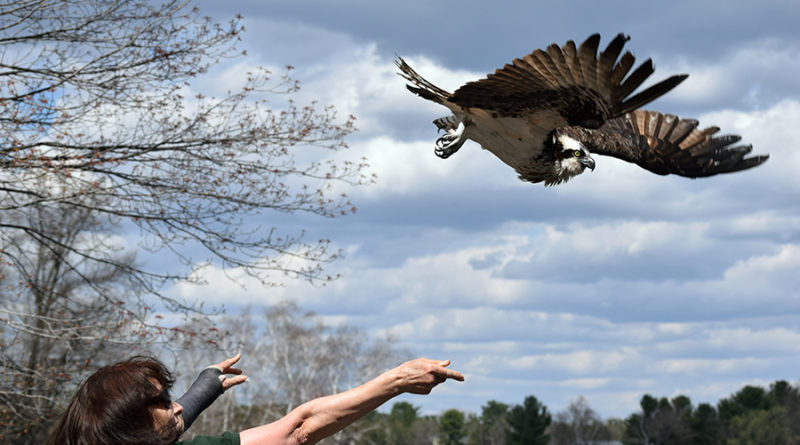Osprey nearly killed by snow storm released in Lake District
By Brandi Makuski
Residents in the Lake District on Sunday gathered to witness the release of a bird that was almost dead a month ago.
An adult female osprey was released on May 6 over McDill Pond, following weeks of intense nursing at a special facility in Antigo run by Raptor Education Group, Inc. (REGI). The bird was rescued from the yard of a Lake District resident during an April 14 blizzard that dumped almost two feet of snow across the region.
As a result of the late snow cover, most migrating birds were left without food. Local stores quickly ran out of seed and suet packs as locals rushed to feed spring birds, with encouragement from the local chapter of the Audubon Society.
Residents say when they spotted the bird, it appeared weak and was unable to fly, according to Della St. resident Krista Olson.
“They were trying to figure out who to call during that snow storm,” Olson said. “They didn’t know how to pick it up or what to do with it.”
Olson said the group called the Wisconsin Dept. of Natural Resources, the Portage Co. Humane Society, the non-emergency number at the Portage Co. Sheriff’s Office, and other resources with no luck. Finally, on advice from Portage Co. dispatchers, she said, a group of residents managed to lift the bird from the snow and place it inside a clean box.
Soon, the bird was transported through the figurative hands of Nature’s Niche – Nature Treks; then via several other volunteers in the Stevens Point area made its way to a REGI office in New London, then finally to Antigo.
She’d spend the next month there, recovering and rebuilding muscle.
“She looked like a turkey after Thanksgiving meal,” said Marge Gibson, who helped nurse the bird back to health. Gibson spent 30 years working as a field biologist before founding REGI in 1990, filling a gap in on-call emergency avian care. “She had no breast muscle, and that’s the muscle birds use to fly.”
Gibson said the REGI group received “over 300 calls” during and immediately following the storm, but the nonprofit has limited staff and resources, and wasn’t able to assist each bird reported.
“I have to say, our Facebook page is very active and people really do care,” she said. “We like to use it to educate people, and they really respond.”
REGI assists eagles and other injured birds throughout the entire state, but will only travel a certain distance for most birds, she said.
For more informaiton on REGI, go to www.raptoreducationgroup.org.

